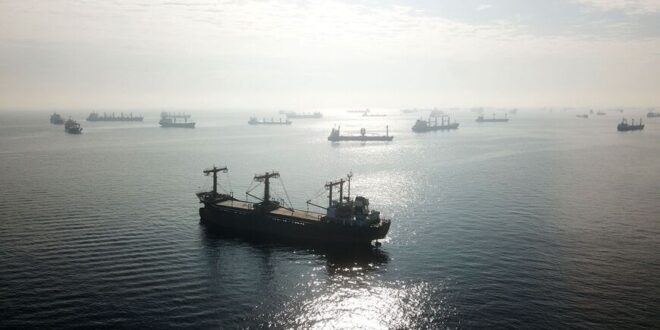Russian and Ukrainian monitors have reportedly suspended the inspections required by a grain-exportation deal that Moscow insists is unfairly benefitting Kyiv.
Turkey is stepping up efforts to salvage a critical deal to export Ukrainian grains after Russia announced it was suspending its participation over alleged Ukrainian attacks on occupied Crimea. In a phone call today, Russia’s President Vladimir Putin told his Turkish counterpart Recep Tayyip Erdogan that Moscow could resume the deal if it has “real guarantees” from Kyiv.
Turkish Foreign Minister Mevlut Cavusoglu had spoken to his Russian counterpart Sergey Lavrov Monday to discuss conditions under which Russia would resume its role in the deal. The agreement brokered in July by Ankara and the United Nations allowed Ukraine, the world’s top supplier of grains alongside Russia, to resume exports amid mounting fears of a global food crisis.
Turkey’s Defense Minister Hulusi Akar held a separate call with Russia’s defense chief, Sergei Shoigu, urging the Kremlin to reconsider its stance. Akar called the deal “a purely humanitarian effort” and said it should be set apart from the ongoing war between Russia and Ukraine.
Erdogan has vowed to keep the deal alive. “Even if Russia behaves hesitantly because it didn’t receive the same benefits, we will decisively continue our efforts to serve humanity,” Erdogan said in a speech Monday.
Under a pair of agreements reached separately with Russia and Ukraine, both countries are allowed to ship grain and fertilizers through a so-called grain corridor running through the Black Sea. Incoming and outgoing ships are screened by a team of monitors at a dedicated center in Istanbul that is staffed by Russian, Ukrainian, Turkish and UN inspectors.
Omer Celik, spokesperson of Erdogan’s ruling Justice and Development Party, said Russian personnel stationed at the Joint Coordination Center are no longer taking part in the inspections, though they have yet to abandon their posts. Ukrainian personnel have also voluntarily relinquished their role until a new deal is reached, leaving Turks and the United Nations to fulfill the task.
The stakes are high for Turkey, the world’s second largest recipient of Ukrainian grains after Spain. The July deal bolstered Erdogan’s image as one of the few leaders who can speak to Washington, the Kremlin and Kyiv and actually deliver results.
Russia insists that the deal is lopsided with Ukraine reaping the bulk of the benefits.
The Russian Defense Ministry announced Saturday that it was halting the grain deal for an “indefinite period of time” in response to alleged Ukrainian drone attacks on its ships in the Black Sea.
Russia’s state news agency TASS, citing the country’s Foreign Ministry, reported that Lavrov had told Cavusoglu that resuming cooperation under the agreement would only be possible with “necessary guarantees” from Kyiv.
Three more vessels left Ukrainian ports Tuesday with Turkey, Ukraine and the UN’s approval, according to the coordination center. On Monday 12 ships carrying 334,000 tons of grain set sail from Ukraine, leaving many wondering whether Russia’s participation is even necessary.
Yoruk Isik, a geopolitical observer based in Istanbul who closely tracks Russia’s illicit trade in looted Ukrainian grain, noted that Russia’s naval fleet is in total disarray. Its best remaining warships are moored in the far north of the Black Sea, he told Al-Monitor, and therefore Moscow lacks the muscle to implement a blockade of Ukrainian ports at this stage of the conflict. “If the rest of the world says, ‘We are carrying on with the export of Ukrainian grain’, there is nothing Russia can do” short of attacking Ukrainian ports, thereby depriving the world’s most needy of food and driving up insurer fees for Ukrainian vessels, Isik said. “If Russia wants to embarrass itself further it can do this, I suppose.”
Analysts say Russia’s goal is to wrest more concessions. “They want better terms for themselves via Turkey,” said Yevgeniya Gaber, a former Ukrainian diplomat and senior fellow at the Atlantic Council and Carleton University’s Centre in Modern Turkish Studies.
Gaber said Russia’s reasoning for freezing its participation made “no sense.” The attacks it cited for justifying the move occurred 220 kilometers (134 miles) away from the grain corridor. “Russia itself has been shelling Ukraine, launching missiles from the Black Sea. By that logic, Russia is also violating the deal.”
Gaber believes that Russia wants to increase the volume of grains and fertilizers it’s exporting through the corridor at Ukraine’s expense. “They want more Russian exports and fewer Ukrainian exports,” Gaber told Al-Monitor.
Russia also wants a resumption of ammonia exports via Ukraine. A pipeline carrying Russian ammonia, a key ingredient in the production of nitrate fertilizers, to the Black Sea port of Odessa ceased to function following Russia’s Feb. 24 invasion of Ukraine. The United Nations has been pressing the sides to reach an agreement, as first reported by the Financial Times in September.
Russia likely also wants Ukraine to halt its offensive to retake Kherson, a critical port city in the country’s south, a demand that Ukraine will almost certainly spurn as it seeks to consolidate its recent battlefield gains.
 Eurasia Press & News
Eurasia Press & News




